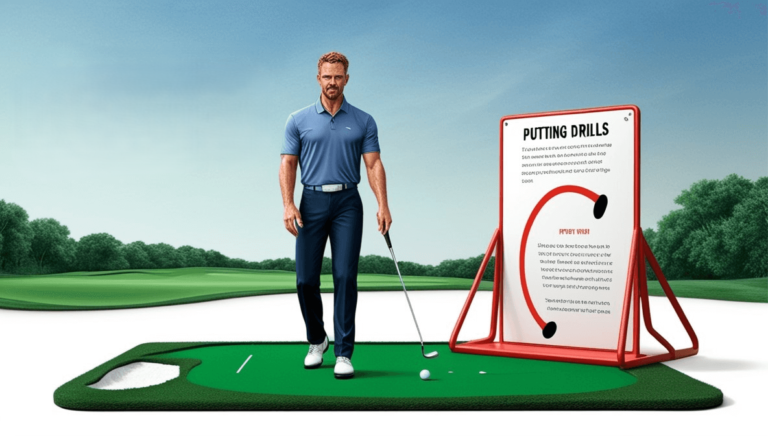Can You Play Golf with a Hernia?
- Golf Basic
- Mark Eddie
Playing golf with a hernia can be an uncomfortable experience, but it doesn’t have to be. For those who suffer from this condition, there are ways to manage the pain and still enjoy a round of golf. With more than 10 years of experience writing about health topics, I’m here to answer the question: Can you play golf with a hernia?
The short answer is yes; however, it is important to take certain precautions when playing. Depending on the severity of your hernia and any other medical conditions you may have, there are strategies that can help reduce discomfort while playing.
Golfers who have been diagnosed with a hernia should consult their doctor before attempting any physical activity. By taking extra steps for safety and comfort, players can continue enjoying the game they love without fear of further injury or pain. Read on to learn more about how to play golf safely with a hernia.

Key Takeaways
- Golf can be enjoyed by people with a hernia, but it is important to check with your doctor first.
- Proper stretching and warm-up exercises are essential for preventing injury while playing golf with a hernia.
- Choose the right clubs that provide more control and comfort when swinging with a hernia.
- Consider wearing a supportive belt or brace to reduce pain and discomfort during golfing activities.
What is a Hernia and How Does it Affect Golfing?
A hernia is a medical condition that occurs when an organ or tissue pushes through the wall of muscle or connective tissue that usually contains it. It can affect any part of the body but is most common in the abdomen, groin, and upper thigh area. In golfers, hernias can be caused by repetitive swinging motions, which put strain on the muscles and tendons in these areas.
Hernias cause pain and discomfort, as well as other symptoms such as swelling, bulging in the affected area, and difficulty with bowel movements. For golfers, this can make playing difficult due to reduced mobility and strength in their swing. In severe cases, surgery may be necessary to repair the hernia and restore normal movement and function.
Tips for Playing Golf with a Hernia
- Wear a belt or wrap around your waist for extra support. This will help reduce strain on the area of the hernia and provide more stability when swinging.
- Consider using a cart instead of walking the course. Pushing or pulling a cart puts less strain on your body than carrying clubs in a bag while walking from hole to hole.
- Take frequent breaks during play and stretch regularly throughout your round of golf to keep muscles loose and prevent fatigue in the abdominal area where the hernia is located.
- Make sure to use proper form when swinging so that you don’t put any extra stress on your abdomen or groin area where the hernia is located. Proper form includes keeping your back straight, maintaining good balance, and not over-rotating through impact with the ball.
- Avoid wearing tight clothing that may constrict movement in areas near where the hernia is located such as shirts tucked into pants or tight belts around your waistline which can cause irritation or discomfort during swings and movements associated with golfing activities such as bending down to pick up balls from holes etc..
If you’re an avid golfer who has been diagnosed with a hernia, playing golf can still be an option. Here are some tips to help make your game as comfortable as possible:
Common Challenges of Playing Golf with a Hernia
Golf is a great sport to enjoy with friends and family, but playing golf with a hernia can be challenging. A hernia is an injury or medical condition that causes the internal organs to protrude through weakened muscles in the abdominal wall. While it’s possible to play golf with a hernia, there are some common challenges associated with it.
One challenge is pain. It’s very likely that you will experience some degree of discomfort while playing golf with a hernia. This pain may limit your range of motion and make swinging difficult. Additionally, bending over to pick up balls can also cause pain and discomfort.
Another challenge associated with playing golf with a hernia is fatigue. The extra strain on your body from swinging and walking around the course can quickly tire you out. To combat this, try taking more breaks throughout your round or even consider using a cart if available at the course you’re playing at.
Finally, another common challenge of playing golf with a hernia is difficulty breathing due to increased pressure on the diaphragm as well as reduced lung capacity resulting from muscle weakness in the abdomen area caused by the hernia itself. To help alleviate this issue, focus on taking slow deep breaths while playing and avoid overexerting yourself during each shot so you don’t become winded too quickly.
The Benefits of Taking Care When Golfing with a Hernia
Golfing with a hernia is not impossible, but it does require extra care. Taking the time to modify your golf swing and use proper technique can help you avoid any further injury or discomfort while still enjoying the game. Here are some of the benefits of taking extra precautions when golfing with a hernia:
Improved Comfort
By using modified techniques, such as avoiding full swings and focusing on short shots, you can reduce strain on your abdominal muscles and improve your overall comfort level while playing.
Reduced Risk
Taking care when golfing with a hernia can also reduce your risk of exacerbating an existing condition or causing further damage to the area.
Increased Mobility
Proper form helps keep your body loose and mobile, allowing for greater range of motion during each shot. This will help you make more accurate shots in less time, making it easier to get around the course quickly without sacrificing accuracy or control over your shots.
Improved Performance
With increased mobility comes improved performance; if you’re able to move freely throughout each swing then you’ll be able to hit farther and straighter than before!
How to Find the Right Equipment for Golfing with a Hernia
Golfing with a hernia can be tricky, but it doesn’t have to be impossible. If you’re looking for the right equipment to help you golf with a hernia, here are some tips to consider.
Look for lightweight clubs
It’s important that your golf clubs aren’t too heavy, as they could put additional strain on your hernia. Look for clubs made of lighter materials such as graphite or titanium so you don’t tire yourself out during your round.
Choose an ergonomic grip
A good grip can make all the difference when playing with a hernia, so look for one that fits comfortably in your hand and won’t cause any extra strain on your body.
Invest in supportive shoes
When playing with a hernia, it’s important to wear shoes that offer plenty of arch and heel support to reduce any potential stress on the affected area of your body. Make sure they fit properly and are comfortable enough to play in all day long!
Consider specialized apparel
Specialized apparel such as belts and braces can provide extra support while golfing with a hernia, helping to reduce pain and discomfort throughout the round.
FAQs
Is it safe to play golf with a hernia?
Answer: It is generally not recommended to play golf with a hernia, as the physical strain of swinging a golf club can worsen the condition and cause further injury. It is best to seek medical advice before engaging in any activities that may put strain on an existing hernia.
What are some alternatives for exercising if I have a hernia?
Answer: Depending on the severity of the hernia, there are many low-impact exercises that can be done safely without putting too much strain on the area. These include swimming, yoga, pilates, tai chi, walking or light jogging.
Are there any treatments available for hernias?
Answer: Yes, there are several treatment options available for hernias depending on their severity and location. These include medications such as pain relievers and anti-inflammatory drugs; lifestyle modifications like avoiding strenuous activity; wearing supportive garments like trusses or belts; and surgical repair through open surgery or laparoscopic procedures.
How can I prevent developing a hernia?
Answer: The most effective way to prevent developing
Mark Eddie
Hello! I am Mark Eddie
I’m a passionate golf enthusiast and content creator. On my niche site, I share tips, reviews, and insights to inspire golfers of all levels to elevate their skills and truly enjoy the game.
“Someday, the swings you didn't take will haunt you more than the ones you did. Embrace the game—every shot counts.”
- Tiger Woods Tweet
Related Posts


Who Tees Off First In Golf?
August 25, 2024

What to Wear to Golf Simulator?
July 7, 2024

How Long Does It Take to Build a Golf Course?
April 21, 2024
Subscribe to the mailing list to receive posts updates!
Sign up for my newsletter to see new photos, tips, and blog posts. Do not worry, we will never spam you.

Affiliate Disclaimer
Some links on this site are affiliate links, meaning we earn a commission if you make a purchase. This comes at no extra cost to you. Thanks for your support!